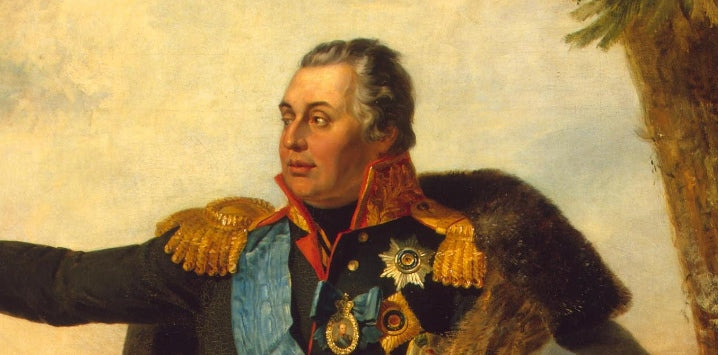Part 8 of our series Ten Greatest Generals of the Napoleonic Wars features Field Marshal Mikhail Kutuzov, best known as supreme commander of the Russian army during the 1812 campaign. Kutuzov features prominently in Tolstoy's War and Peace as a wise and patient commander who embodies the spirit of the Russian army.
Mikhail Illarionovich Golenishchev-Kutuzov (1747-1813), His Serene Highness Prince Kutuzov-Smolensky
Mikhail Kutuzov’s name is synonymous with the Russian army’s defeat of Napoleon’s ill-fated 1812 campaign, especially for those who have read Leo Tolstoy's War and Peace. Born in St Petersburg in 1747 (it had been received wisdom that he was born in 1745), Kutuzov had spent most of his military career fighting against the Ottomans serving under famed generals Pyotr Rumyantsev and Alexander Suvorov. During these campaigns he suffered two near-fatal head wounds (in 1774 and 1788) which disfigured his right eye. Kutuzov regarded his miraculous survival on both occasions as a sign that his life was being preserved to accomplish a great deed. Kutuzov was well-regarded by Suvorov, who referred to him as his 'right arm.' Kutuzov led a column during the storming of the Ottoman fortress of Izmail in 1790.
Kutuzov had been a favourite of Tsar Paul I, whose assassination in 1801 saw him fall out of favour. Nevertheless, he was appointed commander-in-chief of the allied Austro-Russian army which confronted Napoleon in 1805. After learning of General Mack’s capitulation at Ulm, Kutuzov organised an impressive retreat to join up with a second Russian army under the command of Fyodor Buxhoeweden. On the eve of the Battle of Austerlitz, Kutuzov favoured fighting a defensive battle. He was overruled by Tsar Alexander who transferred the command to Austrian Chief of Staff General Weyrother. During the battle, Kutuzov obstinately refused to move his troops from the high ground at the Pratzen Heights until being personally ordered to do so by the Tsar. This gave Napoleon the opportunity he wanted to strike at the allied centre. Despite his warnings coming to fruition, Kutuzov fell into disgrace once again as the Tsar held him responsible for the defeat at Austerlitz.
In 1811, as a resumption of hostilities with Napoleon was widely anticipated, Kutuzov was appointed commander-in-chief of the Russian armies participating in the war against the Ottomans (1806-12) in order to bring it to a successful conclusion and free up the army for action against the French. Kutuzov duly defeated the Turks at Rushchuk (Ruse, Bulgaria) and surrounded the Grand Vizir’s army. He then negotiated the advantageous Treaty of Bucharest, signed at the end of May. Kutuzov returned to St Petersburg, leaving Admiral Pavel Chichagov in charge of the Army of the Danube. Upon his return to Petersburg, Kutuzov was asked to organise a militia to defend the capital.
Meanwhile, the Russian army was retreating hundreds of miles in the wake of Napoleon’s advance. Disagreements between Generals Barclay and Bagration led to calls for the Tsar to appoint an overall commander. Although personally ambivalent towards the old general, Alexander realised he had no choice but to appoint Kutuzov. Although he could not mount his horse without assistance, Kutuzov’s arrival at the battlefield raised the morale of the rank-and-file, but he ordered the Russians to resume their retreat before arriving at the village of Borodino. Kutuzov himself played a relatively minor role at the Battle of Borodino, allowing his subordinates – Barclay de Tolly, Bagration, Miloradovich, Bennigsen – to give most of the orders. Although these commanders had their own bitter personal rivalries, Kutuzov managed to ensure that they would work together. Meanwhile, Kutuzov’s presence proved a great morale boost for the Russian soldiers fighting on the approaches to Moscow.
Both sides suffered heavy casualties at Borodino, and Kutuzov ordered the Russian army to withdraw to Moscow. He had initially intended to fight a battle outside the walls of Moscow and took up a position on the western approaches to Moscow. However, when alerted to the unfavourable terrain, he called the Council of Fili, where he resolved to order retreat and to abandon Moscow to Napoleon. It was a fateful decision which did not receive universal support. Kutuzov then made the crucial decision to lead the Russian army southwest on the Kaluga road, anticipating that the French army would soon be in desperate need of supplies. After setting up camp at Tarutino, the Russians defeated Murat’s vanguard before blocking Napoleon at Maloyaroslavets, forcing him to return to Smolensk along the road he came.
As the Grande Armée embarked on its great retreat, Kutuzov’s army progressed along parallel routes where supplies were more plentiful. Meanwhile, General Wittgenstein and Admiral Chichagov were pushing back Napoleon’s northern and southern wings. While Napoleon dithered in Smolensk, Kutuzov outflanked the French at Krasny and attacked retreating French, General Miloradovich's vanguard virtually annihilating three corps in the process. While the Russians were in a far superior position, Kutuzov sought to avoid a full scale engagement, preferring to shadow the enemy as they battled the cold, hunger, disease, and regular attacks from Cossacks and partisan detachments.
Once the French completely evacuated Russia, Kutuzov reluctantly crossed the border to continue the pursuit and captured several fortresses in Poland and Germany at the head of an allied Russo-Prussian army. He fell ill at Bunzlau (Bolesławiec, Poland) and died on 28 April 1813. His body was brought back to St Petersburg and buried with military honours at the Cathedral of Our Lady of Kazan on Nevsky Prospekt, the city’s main thoroughfare.
Check out our Catuzov tote bag!





Share and get 15% off!
Simply share this product on one of the following social networks and you will unlock 15% off!